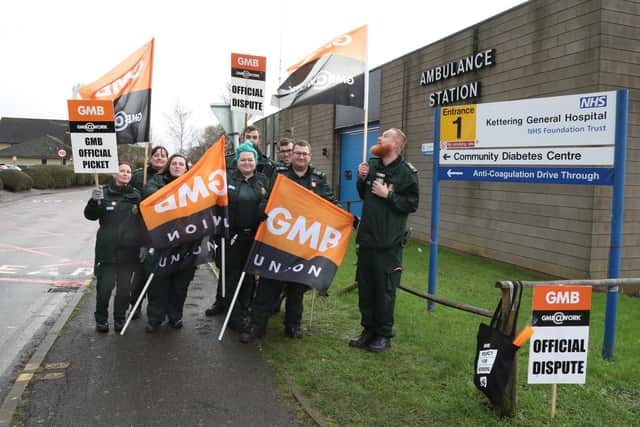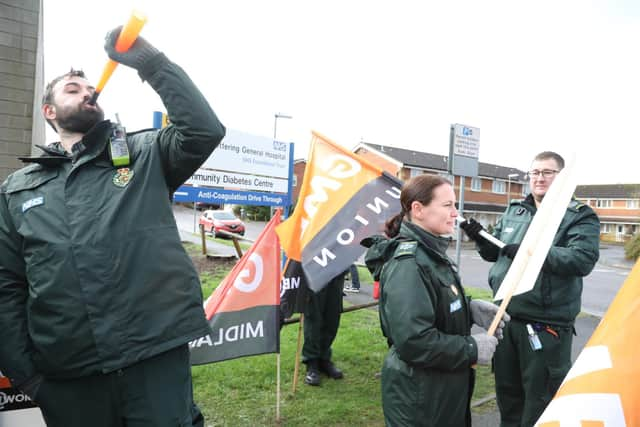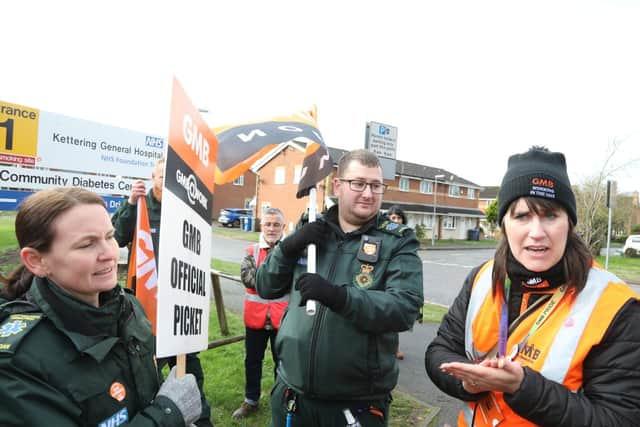'It's not about pay' - 'underfunded, misused and mistreated' Kettering ambulance crews explain why they are striking
and live on Freeview channel 276
East Midlands Ambulance Service (EMAS) staff – paramedics and technicians – have been manning picket lines in their first 24-hour strike.
Some staff will still be attending 999 calls for the most serious categories of emergency as colleagues highlight the state of the ambulance service.
Advertisement
Hide AdAdvertisement
Hide AdThe GMB trade union, that represents EMAS staff, received enough votes to mandate strike action, including its Northamptonshire employees.


Buoyed by support from hospital colleagues and members of the public, ambulance crew members said it wasn’t about pay but conditions for patients.
Ambulance technician Christopher Cherrett said: “The service is at breaking point. We are underfunded, misused and mistreated. Four years ago I would never have thought it but I have to put a body camera on in case we get assaulted. I have worked for four years. I remember I used to do eight jobs in a shift, now we might do two.
“The other day I had just cleared a job at KGH and then we were dispatched to Leicester because we were the closest (available crew)."
Advertisement
Hide AdAdvertisement
Hide AdAmbulance crew members have spoken of the pressures not only from the volume of calls automatically put through from the NHS 111 service but also the problems of no bed spaces in hospitals.


As patients wait in ambulances for bed space patients arriving in ambulances have been unloaded into ‘HALO’ corridors – temporary ‘wards’ where beds are put in walkways and ambulance staff used to monitor patients.
Paramedics have reported that they can spend a whole shift waiting for their patients to be admitted as they monitor vital signs. As well as long waits outside A&E, crews have been sent from job to job without breaks.
One paramedic, who did not wish to be named, said: “It’s not about pay, it’s about patient conditions. People are desperate. Everyone who signed up for this job knew the pay.”
Advertisement
Hide AdAdvertisement
Hide AdShe described being used as a ‘taxi service’ after her patient was treated on board outside A&E by the doctor after waiting for hours, the ambulance crew was then asked to drive them home.


One paramedic with nine years’ service said one major problem was the automatic call-outs triggered by 111 patients not being called back within the 40 minutes with crews being called to ‘coughs’, ‘nose bleeds’ and when a prescription is needed.
Fellow technician Jamie Gibbs said: “The service isn’t at breaking point. It can be fixed. The NHS is amazing – it needs work.”
Today’s strike will run for 24 hours, ending at 6am on Thursday (December 22) with another strike due to take place from 6am Wednesday, December 28 and Thursday, December 29.
Advertisement
Hide AdAdvertisement
Hide AdBen Holdaway, director of operations at EMAS, said: “During the period of the dispute, we will do all we can to minimise the impact on patient safety and will continue to work very closely with trade union colleagues, regional service providers and NHS Employers.
“Our operational teams have developed contingency plans to aim to maximise the number of ambulance staff and volunteers we have available to respond to patients, as well as clinical staff able to carry out remote clinical assessments.
“However, we anticipate that on days where there is industrial action that there will still be fewer ambulances available and therefore our responses to our patients will, inevitably, be much slower on the day.
“Therefore our 999 control rooms, where possible, will carefully assess and prioritise an ambulance response for those who need it most, and this may only be where there is a threat to life.
Advertisement
Hide AdAdvertisement
Hide Ad“Patients should continue to call for an ambulance as normal if they experience a life-threatening emergency and should continue to access other more appropriate services for any other illnesses or injuries such as NHS111 online or contacting their local Urgent Treatment Centre.
“We fully respect the right of NHS staff to take lawful and peaceful industrial action, however we do urge national employer representatives and trade union colleagues to proactively engage and reach a negotiated settlement to the dispute as quickly as possible.”
The bosses also said there are currently no plans for military involvement.
Toby Sanders, chief executive, NHS Northamptonshire Integrated Care Board, said: “This is an unprecedented situation for the NHS and as we continue to face on-going pressures in our system we are urging anyone with, or who requires urgent but not life-threatening care to first seek medical help from their GP Practice or NHS 111 online or if it’s appropriate to seek support from an alternative NHS service such as your local pharmacy or the urgent care centre.”